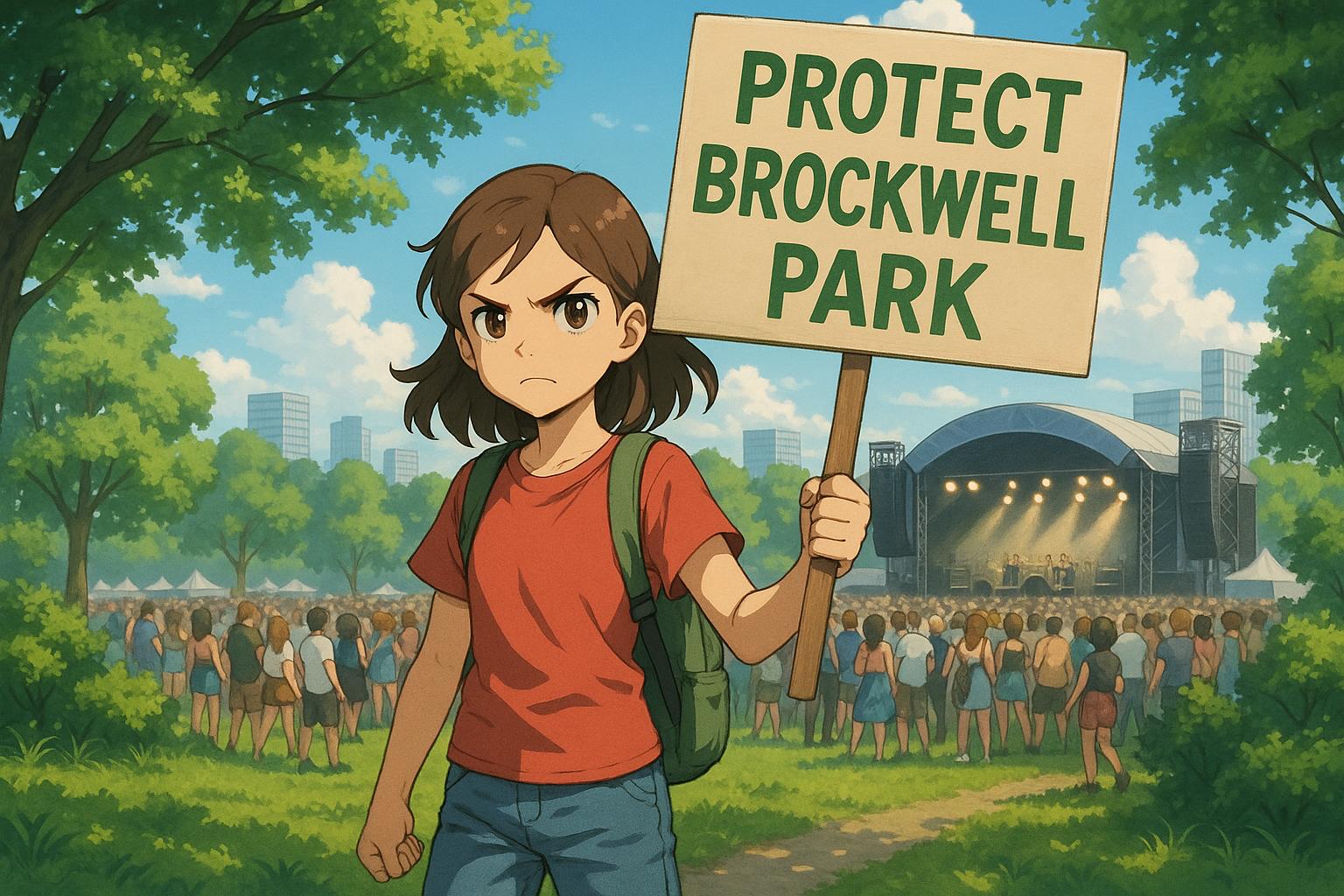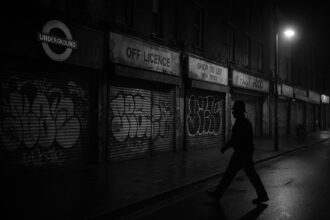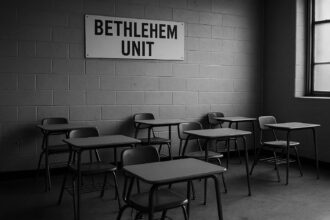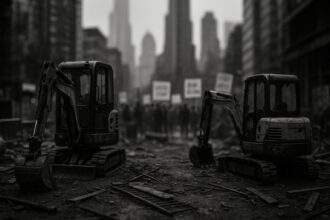Tensions flare in Brockwell Park as local residents and Protect Brockwell Park campaigners confront Lambeth Council over plans that exceed legal limits on commercial festival days, raising concerns about noise, ecological damage, and community exclusion during a summer packed with major events.
Brockwell Park in London has become a flashpoint for tension between local residents, environmental activists, and event organisers as the city gears up for a summer filled with festivals. At the heart of the matter is the ongoing battle between the Protect Brockwell Park campaign group and Lambeth Council, which has moved forward with plans for a series of high-profile music events despite a recent High Court ruling. This ruling found the council acted unlawfully by exceeding the 28-day limit on commercial activities in public parks, as the festivals in question are expected to last for a cumulative 37 days, including setup and breakdown periods.
Rebecca Shaman, who leads the Protect Brockwell Park group, has articulated the community’s concerns over the mounting frequency and scale of these festivals. The group has voiced frustrations regarding the lack of transparency in the decision-making process, with members stressing that their aim is not to eliminate festivals entirely, but to ensure they provide genuine benefits to the local community. Jen Hawkins, a group representative, expressed this sentiment, stating, “We’re not anti-festivals. We believe in community-focused events that take into account the stakes for local residents.” The sense of exclusion is palpable, as many residents rely on the park as their main connection to nature, given that not all have accessible private gardens.
The festivals, which include notable events like the Mighty Hoopla and Field Day, are projected to attract around 285,000 attendees this summer. While these events are hailed by some as cultural milestones, offering diverse programming for various audiences, including significant minority representations, they bring undeniable challenges. Residents have reported rising incidents of noise pollution, illegal parking, and vandalism associated with the influx of festival-goers. For instance, a community member described the recent noise levels during the festivals as a “nightmare,” exacerbating the already difficult dynamic between local living conditions and large-scale commercial events.
Economic factors are at play as well. The council justifies its decisions by citing the economic benefits that arise from hosting such festivals. They contend that the income generated is crucial for maintaining local services and ensuring investment in community projects. High-profile festivals like those in Brockwell Park have reportedly generated substantial revenue for the council, with similar parks reaping millions from events. However, this economic rationale is met with scepticism by critics who question whether the short-term financial gains justify the long-term costs to community integrity and environmental health.
Beyond immediate concerns of noise and access, the ecological impact of large events has been a source of intense debate. Notable figures like Sir Mark Rylance have openly critiqued the damaging effects of these festivals on the park’s ecosystem, highlighting that the removal of trees and unsustainable ground conditions have long-lasting consequences. Residents, including community leaders, worry that the drive for profit is overshadowing the fundamental purpose of public green spaces, which should serve as communal havens rather than arenas for commercial exploitation.
Despite community pushback and legal challenges, Lambeth Council has continued to endorse these festivals, often citing a legal certificate that allows for the ongoing use of the park for commercial activities. In the face of a well-organised resistance, the council’s approach has sparked a broader dialogue about the future of public spaces in urban environments. The Protect Brockwell Park group, bolstered by recent fundraising efforts to support ongoing legal battles, is steadfast in advocating for a vision where community welfare and environmental stewardship take precedence over commercial interests.
As this summer unfolds, Brockwell Park’s situation exemplifies the delicate balance between cultural enrichment and the rights of local residents to access and enjoy their shared spaces. The outcome of these events may well set precedents for other urban parks grappling with similar dilemmas, as cities continue to navigate the complexities of managing public spaces in an increasingly commercialised landscape.
Reference Map:
- Paragraph 1 – [1], [4]
- Paragraph 2 – [1], [3], [6]
- Paragraph 3 – [2], [5], [7]
- Paragraph 4 – [2], [3], [6]
- Paragraph 5 – [3], [5], [7]
- Paragraph 6 – [1], [2], [4]
- Paragraph 7 – [1], [4], [6]
Source: Noah Wire Services
- https://www.express.co.uk/news/uk/2059496/we-live-park-fenced-off-cash-brockwell-brixton – Please view link – unable to able to access data
- https://www.ft.com/content/4d70a5b0-3ec2-4f92-83c5-8d3450d1f1f3 – London’s summer festival scene, including events like Raver Tots and Mighty Hoopla, has become a contentious issue between local councils, residents, and event organizers. With festivals occupying London parks for a combined 140 days in 2025—a 14% increase from the previous year—residents argue the events limit public access, damage the environment, and create noise pollution. Councils, facing significant budget shortfalls due to central government cuts, see these festivals as vital revenue sources. For example, Finsbury Park and Victoria Park generated £1.2 million and £1.6 million respectively from such events. A legal dispute over Brockwell Park in Lambeth highlighted these tensions. A High Court ruling found the council exceeded legal limits on event durations, yet festivals are proceeding under a newly approved certificate. The Protect Brockwell Park group continues legal efforts to stop them, while facing lawsuits from organizers. Critics warn of the risks of commercializing public spaces and the lack of strong negotiation positions by councils against powerful festival operators. Nonetheless, supporters argue that festivals serve cultural purposes and benefit younger and ethnically diverse audiences, with 27% of ethnic minorities having attended festivals versus 19% of white Londoners.
- https://www.ft.com/content/0dbe0089-c93c-47a3-bcf7-a0c5038b289f – A controversy has erupted in London’s Brockwell Park over the hosting of large-scale music festivals, spotlighting the tension between public enjoyment and preservation of green spaces. Lambeth Council’s plan to host six festivals drawing an estimated 285,000 attendees triggered a legal battle, with a High Court judge ruling the council lacked the necessary planning permissions. Local resistance intensified after trees were removed for festival preparations and last year’s events left the park damaged and muddy. Notable figures like Sir Mark Rylance have criticized the events for harming the park’s ecosystem. Campaigners have raised concerns about increased crime, citing a significant spike in drug offenses during festival periods. In contrast, the council and event organizer Superstruct argue the festivals create cultural opportunities and economic benefits, though critics dispute the allocation of profits. Political ramifications include a Green Party victory on a pledge to protect the park, contrasting with Labour’s prior dominance. The debate underscores broader questions about the commercialization of public spaces and the balance between access, cultural events, and environmental stewardship.
- https://www.ft.com/content/e9389e54-3dd2-460a-a9de-895e05664a10 – The High Court has ruled that Lambeth Council acted irrationally by approving a series of summer festivals in Brockwell Park without adhering to planning law, posing a potential setback for London’s live music sector. Judge Tim Mould KC determined the council breached rules allowing only 28 days of commercial activity in parks without additional planning permission, with festivals in Brockwell expected to last 37 days due to setup and breakdown periods. The legal challenge, initiated by local resident Rebekah Shaman and advocacy group Protect Brockwell Park, highlighted concerns over restricted public access and environmental damage. Although the court did not halt the imminent events, Lambeth Council must revisit its approval process. Protect Brockwell Park emphasized they support festivals but advocate for responsible use of green spaces. The festivals, including Wide Awake, Field Day, and Mighty Hoopla, attract over 285,000 attendees annually and contribute financially to the council. Some are operated by Superstruct, a private equity-backed events firm. Lambeth Council stated it is reviewing the judgment and considering next steps.
- https://www.bbc.co.uk/news/articles/c038l8n6ydpo – Residents near a south London park have expressed their annoyance at “nightmare” noise levels from recent music festivals. Brockwell Park in Lambeth has hosted thousands of revellers during six days of festivals across the past two weeks. Some locals say they are also annoyed at illegal parking, damage to the park’s turf and weeks of having fencing segregating areas of the park. Organiser Brockwell Live said the sound levels had been agreed with Lambeth Council and were “built into our licence”. Lambeth Council apologised to residents but added the noise conditions for this year had been exactly the same as last year, and noise generated was “fully compliant” with “license conditions”.
- https://www.bbc.com/news/articles/c3gg8p770eeo – A free community event in a south London park was cancelled on Wednesday after four bank holiday weekend festivals left the site “churned up” and muddy. Brockwell Park, in Lambeth, hosted four day festivals over the weekend and was due to host family-friendly Brockwell Bounce on Wednesday. Brockwell Live, which organises the series of park events, said it was implementing “additional ground protection” before the Mighty Hoopla on 1 and 2 June and Lambeth Country Show on 8 and 9 June. Lambeth Council says there is “an agreement” that any repairs are paid for by Brockwell Live, adding the local authority puts £500,000 a year into park maintenance. Brockwell Live hosted four festivals at the park from Friday to Monday – Project 6, Wide Awake, Cross The Tracks and City Splash. Peter Bradley, chair of Friends of Brockwell Park, said the festivals cause “long term” damage. Peter Bradley, chair of Friends of Brockwell Park, said the green space had seen “long-term” damage from the summer festivals. “Nature takes a long time to recover,” he said. “The damage to the ground from these vehicle movements, these thousands and thousands of people is long term. He said Lambeth Council “see pound signs”. “It’s not the best that Brockwell Park can be, it’s the worst.” A local resident, who did not want to be named, added: “I’m a musician and I don’t think this is okay. The ground is just ruined. “This is our local community space and I think community spaces have got to stop being used so frequently for these money-making events.” Brockwell Park in south London has been hosting a series of day festivals.
- https://www.standard.co.uk/news/london/brockwell-park-brixton-wide-awake-cross-the-tracks-mighty-hoopla-b1223948.html – Festival organisers who run events in Brockwell Park have “welcomed scrutiny” after campaigners launched a legal challenge to protect the beloved green space from large-scale private events. Brockwell Live, which hosts festivals in the park, including LGBTQ friendly Mighty Hoopla and critically acclaimed jazz and funk festival Cross the Tracks, has defended itself, insisting it takes its “stewardship seriously”. It comes after nearby residents have complained that the festivals are permanently damaging the park, with the Oscar-winning actor Sir Mark Rylance claiming the events have turned the space “into a prison camp”. “Brockwell Live delivers a series of free and ticketed events in Brockwell Park with more than half of attendees coming from across Greater London,” its organisers told the Standard. “Celebrating the city’s diverse music and culture, events include the capital’s largest Caribbean and African music festival, a nationally significant queer pop festival and a critically acclaimed celebration of jazz, funk and soul. “Although 2024 saw weather-related challenges, expert assessments confirm that grass and soil impacts are reversible and remedial work is ongoing. “We understand the importance of Brockwell Park to local residents and take our stewardship seriously. “We welcome scrutiny and maintain open channels for dialogue with residents, councillors, and community groups at all times.” The festivals have donated over £150,000 to local organisations to date through their community fund, and have paid £317,000 to help upkeep the beloved park over the past five years, they explained. Since 2023, the festival organisers have also co-produced the Lambeth Country Show, a free event run by Lambeth Council for 50 years and best known for its vegetable sculpture competition. The production partnership helped the council save over £700,000 last year. The festival organisers also explained that more than 5,000 free tickets are handed out to residents, businesses, charities and NHS workers. Campaigners have also complained about the park being fenced off while events take place inside a ‘ring of steel’. Residents raised concerns about the state of the park following last year’s events, as the combination of heavy rain and festival goers turned the area into a “mudbath”. Up to a third of the park is fenced off during events, according to Brockwell Live, which says it works with biodiversity consultants and arborists to ensure the park is looked after. The festivals also explained they have a designated resident hotline to report any issues. On April 9, local residents group Protect Brockwell Park sent a pre-action letter to Lambeth Council, notifying them of their intent to initiate court proceedings. The group aims to challenge the council’s decision to grant a certificate of lawful development, which would allow commercial events in Brockwell Park to take place without requiring planning permission. A Crowdjustice page has been set up by the group, which has raised over £31,000 to cover legal costs. The group raised several concerns, including HGVs driving across the park, 180,000 festivalgoers in six days, events held in heavy rain, polluting generators running around the clock, and problems with waste and overflowing toilets. They argue these activities have led to “permanent damage” to parts of the grassland and are harming trees, with heavy equipment impacting root protection zones.













